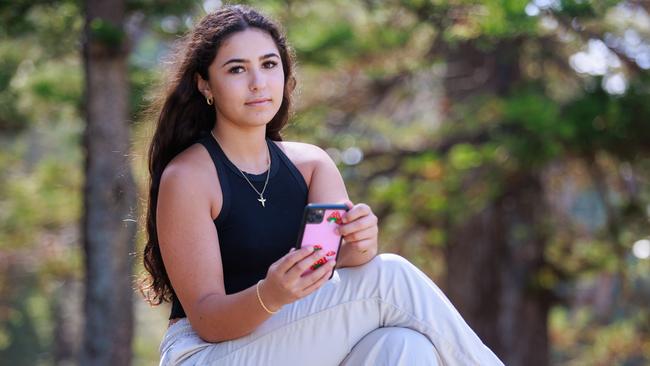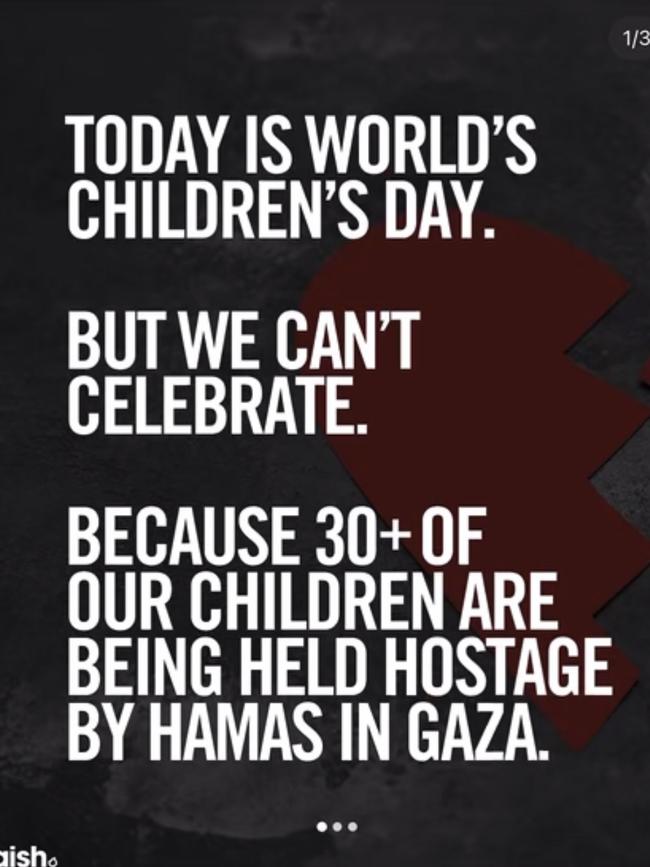Instagram and TikTok serving vile anti-Semitic content to young people
TikTok and Instagram delivering young Australians unbalanced anti-Israel and anti-Semitic content in between snippets of reliable news. See what they’re being shown.

NSW
Don't miss out on the headlines from NSW. Followed categories will be added to My News.
Young social media users who rely on platforms such as TikTok and Instagram to stay informed about the Middle East are being served up unbalanced anti-Israel and anti-Semitic content in between snippets of reliable news, a Daily Telegraph analysis has found.
The Telegraph yesterday asked Sydneysiders aged between 18 and 26 to plug words including “Israel”, “Palestine” and “Hamas” into search bars and record what the algorithms decided to serve them.
Inserted in between links to genuine news articles, some posts included crude anti-Semitic and anti-Israel content.
Rhiannan Papast, a 20-year-old hospitality worker from Maroubra, said searching for the word “Israel” on Instagram immediately presented her a cartoon of a scary Israeli wolf-like creature, guided by a US arm, terrorising a Palestinian woman and her child with the caption: “US extremely concerned by levels of violence”.
And Instagram showed her a cartoon of a bloodthirsty Benjamin Netanyahu taking a scythe off Hitler.

The offensive image was captioned: “The deadliest”.
Ms Papast also said that on Instagram she saw memes justifying Palestinian “resistance” and calls for a halt to arms sales to Israel.
On video sharing site TikTok, it was a similar story, with footage of a man dropping a watermelon on a pro-Israel demonstration and a Palestinian girl distraught over her family being killed in an Israeli air strike.
She said she felt like she could not trust what she was seeing on social media when it came to the Middle East.
“The posts that came up confused me because they have such contradicting arguments from each other, and overall I find it hard to trust what I see on social media, especially when it’s so hard to differentiate what is true and what’s just someone’s opinion that’s made out to look factual,” she said.
“It’s definitely more pro-Palestine, however, that’s the first time I’ve searched up the issue on my social media so the algorithm hasn’t gotten a chance to understand how I view the situation.”

Experts spoken to by the Telegraph revealed that social media algorithms often fed people more of what they indicate they like, potentially distorting news feeds.
“What is recommended to each user depends a lot on what they ‘like’ and who they are connected to as well as what is trending and what is popular,” Sydney University academic Agata Stepnik said.
Damien Bombardieri, an 18-year-old personal trainer from Sylvania, said that one of the first images he was shown when he searched for Israel was the same cartoon of Netanyahu and Hitler.
Another user, 20-year-old Leo Gregory from Randwick searched “Palestine” on Instagram and was shown a meme shared by an account calling itself “dippedinculture” that read: “If a land was promised to you by God, you wouldn’t have to murder, displace and terrorise a group of people for 75+ years to have it.”
One Instagram account claimed Palestinians had “sued Biden for backing Israel’s genocide in Gaza”.
Little of the content seen by the Telegraph offered the Israeli perspective, despite the murder of between 1200 and 1400 civilians on October 7 and the kidnapping of around 240 more by Hamas terrorists.


However, 24-year-old Hills District resident Lauren Moran said that on various platforms she saw more pro-Israel content.
This included Instagram images of a girl holding an Israeli flag saying “I stand with Israel”, although she also saw news reports claiming that “Israel admits to burning hundreds of people on October 7”.
University of Western Sydney researcher Tanya Notley said there was a “huge diversity” in how young people consumed the news. “Most young people are proactive news consumers and have a healthy and diverse media diet on the whole,” she said.
A recent study Ms Notley co-authored about how young Australians engage with the media found that 54 per cent were sceptical about the algorithms social media companies used to serve them news.
A further third tried to influence the way algorithms served them content.


“Platforms can do more, governments can do more,” Ms Notley said, but added that parents were still the number one influence on young peoples’ news consumption.
“One thing we can do as parents when we are talking about the news is to talk about sources and evidence and really teach young people about perspective.”
TikTok said the social media giant had removed more than 925,000 videos from its platform for breaking hate speech, terrorism and misinformation, including pro-Hamas content.
“TikTok removed 100 per cent of anti-Semitic or Holocaust denial content Fighting Online Anti-Semitism reported through our Community Partner Channel last year … nine times out of ten, TikTok removes hate speech before it’s reported,” the company said.
The service also suggested young people “skewed towards Palestine long before TikTok existed”.
The company said this may influence what they see because “recommendations are based on the content people have previously engaged with.”




